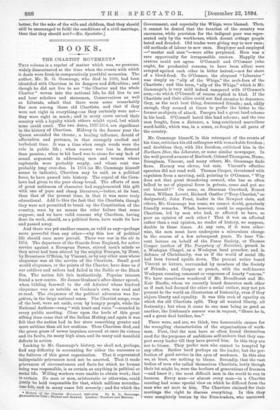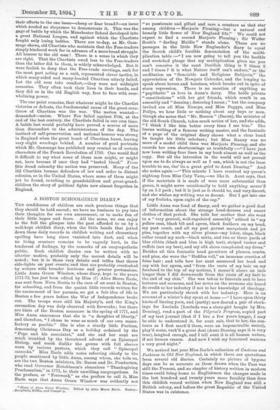BOOKS.
THE CHARTIST MOVEMENT.*
Tins volume is a reprint of matter which was, we presume. widely disseminated at the time when the events with which it deals were fresh in comparatively youthful memories. The author, Mr. R. G. Gammage, who died in 1888, had been identified with Chartism in its dangers and difficulties; and though he did not live to see "the Charter and the whole Charter" woven into the national life, he did live to see and hear scholars and statesmen, Conservatives as well as Liberals, admit that there were some remarkably fine men among those old Chartists, and that if they were not right in everything—as they certainly were not— they were right in much ; and in many cases served their country with a loyalty which others might equal, but which none could excel. The two dates, 1837-1854, are significant in the history of Chartism. Midway in the former year the Queen ascended the throne; a healing influence, devoid of affectation and pretence, in that strangely excited and turbulent time. It was a time when rough words were the rule in public life ; when reason was less in demand than passion ; when to hit hard was to atone for any lack of sound argument in addressing men and women whose cupboards were probably empty, and whose rent was probably long over-due. In 1854 (as Mr. Gammage himself seems to indicate), Chartism may be said, as a political force, to have passed into history. The repeal of the Corn- laws had given to the poor cheap bread. The efforts of men of great nobleness of character had supplemented this gift with one of pure and cheap literature,—better, at its best, than that of the present time, in that it was more truly educational. Add to this the fact that the Chartists, though they were not permitted to break up the Constitution of the country, were by no means the utter failure that some suppose, and we have valid reasons why Chartism, having done its work, should, as a political force, have made its bow and passed away.
And there was yet another reason, as valid as any—perhaps more powerful than any other—why this law of political life should once more prevail. There was war in the air in 1854. The departure of the Guards from England, for active service against a European Power, stirred men's minds as they never had been stirred by the mighty Feargus, by Hunt, by Brointerre O'Brien, by Vincent, or by any other man whose eloquence was at the service of the Chartists. Small good would eloquence, or the points of the Charter, have done us if our soldiers and sailors had failed in the Baltic or the Black Sea. The nation felt this instinctively. Popular interest found a new centre. Sir James Graham's after-dinner speech, when bidding farewell to the old Admiral whose kindred eloquence was as notable as Graham's own, was read and re-read. The eloquence of the political advocates was for- gotten, in the large national sense. The Chartist songs, even of the best, were set aside, even by hungry people, while the National Anthem—sung "with heart and voice "—sounded in every public meeting. Close upon the heels of this great sifting time came that of the Indian Mutiny, and again it was felt that the nation bad in her store something greater and more sublime than all her orations. Thus Chartism died, and the green grass of newer impulses covered at once its virtues and its faults, its many high aims, and its many and manifold defects in action.
Looking to Mr. Gammage's history, we shall not, perhaps, find any difficulty in accounting for either the successes or the failures of this great organisation. That it represented indisputable grievances need not be asserted. That it made grievances of circumstances and facts for which no human being was responsible, is as certain as anything in political or social life. Willing workers were unable to obtain work; that Is certain. No man or men, aristocratic or otherwise, could suatly be held responsible for that, which millions neverthe- less felt, and in many cases felt severely ; and for which the
• Hietory of the Chartist Movement, 1897-1854. By R. G. Genurnage. Newmotle.on.rryno Browne and Browne. London: Truelove and Hanson. Government, and especially the Whigs, were blamed. Then, it cannot be denied that the taxation of the country was enormous, while provision for the indigent poor was repre. sented only by the workhouse, which decent cottage people hated and dreaded. Old trades were giving way to new ones; old methods of labour to new ones. Employer and employed, —" master and man "—were alike perplexed. Here was a rare opportunity for irresponsible orators. Happily the orators could not agree. O'Connell and O'Connor (who ought, for prudential reasons, to have been allies) were arrayed against each other in bitter hatred,—not far short of a blood-feud. To O'Connor, the eloquent "Liberator" was simply an "ally of the Whigs," the arch-foes of the Chartists ; and this term, "ally of the Whigs," which is Mr. Gammage's, is very mild indeed compared with O'Connor's own,—to which O'Connell of course replied in kind. If the Chartists and their allies could not find enemies to denounce, they, as the next best thing, denounced friends ; and, oddly enough, they seemed at times to prefer the latter to the former as objects of attack. Feargus had a great land scheme in his head. O'Connell hated this land scheme; and the two men fought, from a distance, a long-continued marvellous word-battle, which was, in a sense, re-fought in all parts of the country.
Mr. Gammage himself, in this retrospect of the events erf his time, criticises his old colleagues with remarkable freedom ; and doubtless they, with like freedom, criticised him in the Northern Star, the Liberator, or some similar newspaper. In the well-proved armour of Roebuck, Colonel Thompson, Hume, Brougham, Vincent, and many others, Mr. Gammage finds flaws. Harney was clever, but vain. Vincent's effective speeches did not read well. Thomas Cooper, threatened with expulsion from a meeting, said, pointing to O'Connor, "Why does not that great thundering coward, who has so often talked to me of physical force in private, come and put me out himself P " On some, as Sharman Crawford, Erneot Jones, William Lovett, Richard Oastler ("Tory-Chartist," so designated), John Frost, leader in the Newport riots, and others, Mr. Gammage has some, we cannot doubt, genuinely friendly remarks. What, however, could be expected from Chartism, led by men who had, or affected to have, so poor an opinion of each other ? That it was an affected rather than a real opinion, no reader of history, we suppose, doubts in these times. At any rate, if it were other- wise, the men must have undergone a miraculous change in the course of a few subsequent years. To hear Vin- cent lecture on behalf of the Peace Society, or Thomas Cooper (author of Thc Purgatory of Suicides), preach in a Wesleyan Chapel, as a Wesleyan local preacher, and in defence of Christianity, was as if the world of social life had been turned upside down. The present writer heard Vincent so lecture, surrounded by members of the Society of Friends ; and Cooper so preach, with the well-known Wesleyan running comment or responses of hearty "amens." We have sometimes wondered if Mr. Broadhurst and Mr. Keir Hardie, whom we recently heard denounce each other as if each had deemed the other a social outlaw, may not yet present to the world an illustration of fraternity, even if they abjure liberty and equality. It was this rock of equality on which the old Chartists split. They all wanted liberty, all fraternity ; but when it came to one man being as good as another, the Irishman's answer was in request, "Shure he is, and a great daal betther, too."
There were, and are, we think, two honourable causes fec the wrangling characteristics of the organisations of work- men. First, that the men have so often found themselves used for the purposes of ambitions self-seekers that they sus- pect every leader till they have proved him. In this they are not to blame. They prefer men who cannot be tempted by any office; Rather hard perhaps on the leader, but the per- fection of good service in the eyes of workmen. In this also we, at least, see nothing to blame. Secondly, that the vast bodies of men who called themselves Chartists, lowly though their lot might be, were the heritors of generations of freemen —and knew it ; the most difficult men in the world to run in harness, Every man—or almost every man—in a Chartist meeting had some special view on which he differed from the man who sat next to him. The Chartists claimed for their meetings the right to discuss everything. In this they were completely beaten by the Free-traders, who narrowed. their efforts to the one issue—cheap or dear bread P—an issue which needed no eloquence to demonstrate it. This was the gage of battle by which the Manchester School developed into a great National League, and against which the Chartists fought only losing battles. There are to-day, as Mr. Gam- mage shows, old Chartists who maintain that the Free-traders simply hindered work far in advance of a mere bread struggle. All honour to the old men ! There is a sense in which they are right. That the Chartists owed less to the Free-traders than the latter did to them, is widely acknowledged. But it were foolish to deny that the Free-trade meetings, each for the most part acting as a unit, represented clever tactics, in which many-sided and many-headed Chartism utterly failed. Let the old men take comfort,—they were not midnight assassins. They often took their lives in their hands, and they did so in the old English way, face to face with over- whelming power.
The one point remains, that whatever might be the Chartist victories or defeats, the fundamental cause of the great over- throw of Chartism was the war. The nation wanted- demanded—union. Where Fox failed against Pitt, at the end of the last century, the Chartists failed in our own time. A battle lost would probably have proved a source of more than discomfort to the administrators of the day. The instinct of self-preservation and national honour was strong in England when the great bomb of Chartism burst, leaving very slight wreckage behind. A number of good portraits which Mr. Gammage has published may remind us of certain characters of the French Revolution of 1789. One would find it difficult to say what some of these men might, or might not, have become if once they had "tasted blood." From this dread calamity the nation was preserved. Many of the Old Chartists became defenders of law and order in distant colonies, or in the United States, where some of them might yet be found, re-telling to grandchildren and great-grand- children the story of political fights now almost forgotten in England.


































 Previous page
Previous page